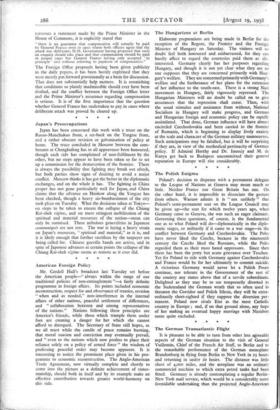The Polish Enigma Poland's decision to dispense with a permanent
delegate to the League of Nations- at Geneva may mean much or little. Neither France nor Great Britain has one. On the - other hand, it 'is impossible to dissociate the gesture from others. Warsaw admits it is " not unlikely " that . Poland's semi-permanent seat on the League Council may be given up—the seat for which twelve years ago, when Germany came to Geneva, she was such an eager claimant Governing these questions, of course, is the fundamental one as to what Poland will do—diplomatically in the diplo- matic stages, or militarily if it came to a war stage—in the conflict between Germany and Czechoslovakia. The Poles have never liked the Czechs, because in the nineteenth century the Czechs liked the Russians, while the Poles regarded them as their most hated oppressors. Since then there has been the petty but acute grievance over Teschen. Yet for Poland to side with Germany against Czechoslovakia and France would be for her ultimately to commit suicide. A victorious Germany would never let a Polish Posen continue, nor tolerate in the Government of the rest Of the country any status above that of a servile subordinate. Delighted as they may be to see temporarily diverted to the Sudetenland the German wrath that so often used to threaten the Corridor and Polish Silesia, they will be extra- ordinarily short-sighted if they suppose the diversion per- manent. Poland now rivals Eire as the most Catholic country in Europe ; and, if on that ground alone, any hope of her making an eventual happy marriage with Nazidom seens quite excluded.
* * * *






































 Previous page
Previous page